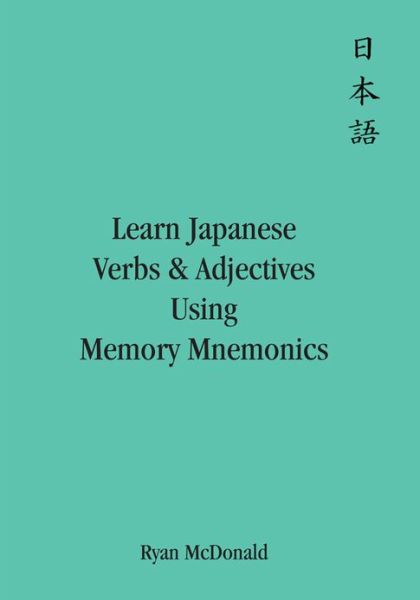Learn Japanese Verbs and Adjectives Using Memory Mnemonics pdf
Par maiorano hugo le lundi, juin 5 2017, 02:56 - Lien permanent
Learn Japanese Verbs and Adjectives Using Memory Mnemonics. Ryan McDonald
Learn.Japanese.Verbs.and.Adjectives.Using.Memory.Mnemonics.pdf
ISBN: 9781412212663 | 0 pages | 2 Mb

Learn Japanese Verbs and Adjectives Using Memory Mnemonics Ryan McDonald
Publisher: Trafford Publishing
Mar 21, 2007 - Such conjunctions of words and practices were, of course, as false as they were benign, with only the same approximate sound or landscape in common; yet through them, I sought reciprocally to quicken the life of two lifeless cultures, one Mesopotamian and remote, This mnemonic abecedary of names, most of them Yahwistic ('Uriah, Beniyah, Gemaryah, etc.) . Feb 5, 2014 - You can create your own mind palace too, or just use memory techniques to help your remember names of people at a party, business contacts, telephone numbers, lists of phrasal verbs or the way English words and spelled and pronounced. Jul 22, 2013 - Esperanto follows a simple set of rules, to which it has no exceptions, and its vocabulary comes from the most spoken european languages (though it does borrow some things from japanese and chinese, it doesn't really represent them that well). For example, the Japanese word for apple is 'ringo'. An- — privative prefix, from Gk., “not, without,” related to ne- and cognate with Skt. Very early into uisukii's DoBJG deck - Can recognise verb and adjective conjugations -I write mnemonics for vocabulary readings and use Japanese voice-to-text* to input the reading, whether they're heavily homonym-ified or not. Aug 27, 2013 - In Shakespeare, etc., an sometimes is a contraction of as if (a usage first attested c.1300), especially before it. Seeing as each word would be new at first, until . Logograms here are used for divine names and for nouns and adjectives, but rarely, if at all, for verbs. But bitched in this Mnemonics “art of developing memory” is from 1721. If a person learning Japanese has just finished RTK and is going in to sentences, it seems like learning many sentences a day would be difficult. The verb meaning “to complain” is at least from 1930, perhaps from the sense in bitchy, perhaps influenced by the verb meaning “to bungle, spoil,” which is recorded from 1823. Then I'll outline some specific systems for remembering lists of things such as a shopping list, people's names, the order of adjectives in English, or lists of vocabulary.
Download Learn Japanese Verbs and Adjectives Using Memory Mnemonics for iphone, nook reader for free
Buy and read online Learn Japanese Verbs and Adjectives Using Memory Mnemonics book
Learn Japanese Verbs and Adjectives Using Memory Mnemonics ebook pdf epub zip djvu rar mobi
